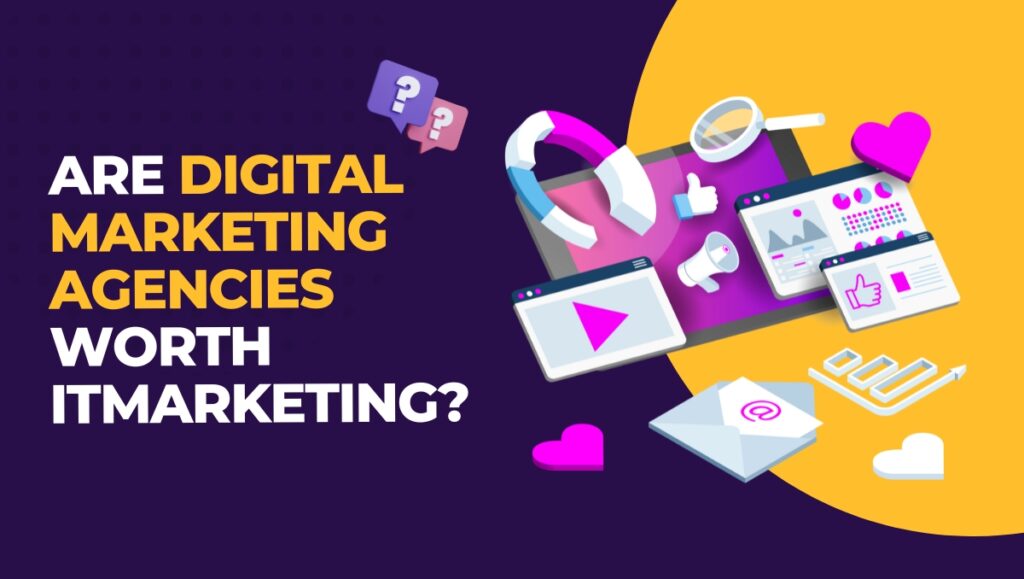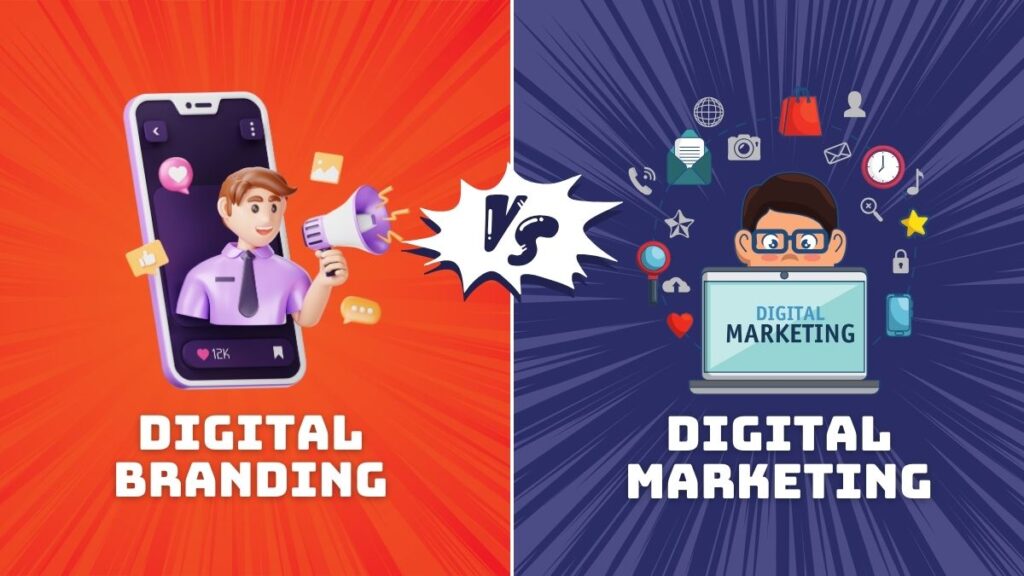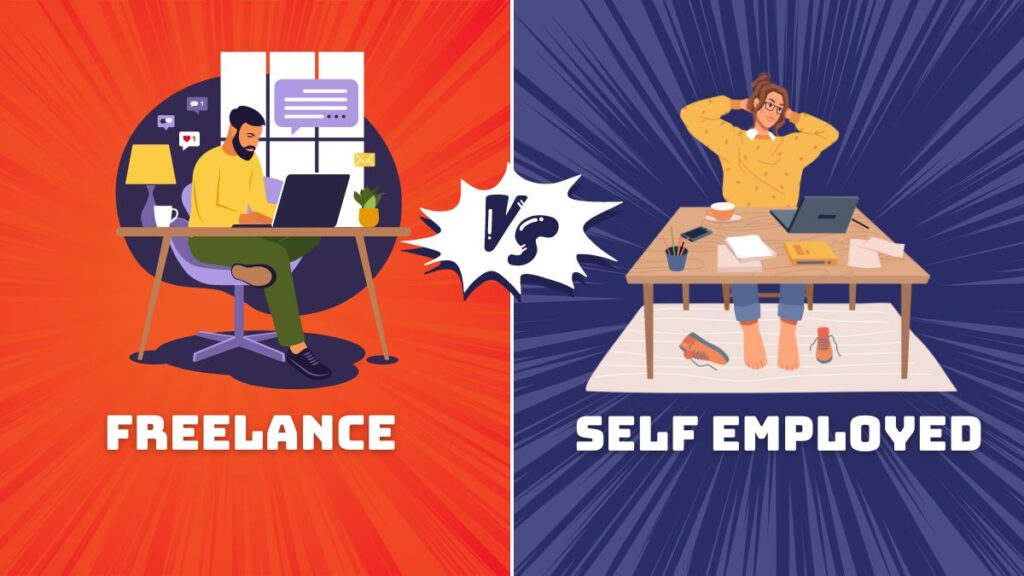In 2024, global advertising spending topped 1.04 trillion US dollars. Digital channels captured 73 percent of that total, or more than 760 billion US dollars, according to eMarketer and the Financial Times.
Businesses of every size are investing heavily online. Yet many still wonder, “Are digital marketing agencies worth it?”
The digital world today is not just about search engines and social media. It includes e-commerce marketplaces, mobile apps, connected TV, voice search, and chatbots. Every new channel offers a way to reach potential customers.
Digital marketing drives acquisition, keeps customers coming back, and builds long-term value in ways that traditional ads cannot match.
Deciding whether to hire an agency comes down to four main factors:
This guide will explore each of these factors. You will learn what agencies do, see the benefits and drawbacks, and find out when agencies make sense and when they do not.
Are Digital Marketing Agencies Worth it?
Yes, a digital marketing agency can be worth it if you want expert help to grow faster, handle campaigns you do not have time or skills for, or scale without hiring a full team. They bring experience, tools, and fresh ideas. But they can also be expensive, so it really depends on your budget, your goals, and what you can do in-house.
Let’s break it down in plain terms to figure out if hiring a digital marketing agency is the right choice for you.
What Is a Digital Marketing Agency?
A digital marketing agency is a specialist partner that helps companies grow online. Agencies offer skills and resources that many businesses cannot build in house quickly. Their work usually falls into these main categories:
Core Services
Search Engine Optimization (SEO)
On-page SEO focuses on optimizing text, headings, images, and internal links.
Off-page SEO builds credibility by earning links from other websites.
Technical SEO improves site speed, mobile usability, and structured data.
Pay-Per-Click Advertising (PPC)
Search ads appear at the top of results on Google or Bing.
Display ads show on websites and apps through programmatic networks.
Shopping campaigns feature product images and prices right in search results.
Remarketing allows you to re-engage visitors who did not convert.
Social Media Management and Advertising
Organic posts build community and engage followers.
Paid ads on Facebook, Instagram, LinkedIn, TikTok, and X help reach new audiences.
Influencer partnerships bring credibility and personal recommendations.
Content Marketing and Copywriting
Blogs, articles, ebooks, and white papers inform and guide readers.
Video scripts and podcasts help brands tell their stories in engaging ways.
Email Marketing and Automation
Drip campaigns nurture leads with a sequence of emails.
Behavioral triggers send messages based on user actions.
CRM integration ties email work to sales and support systems.
Analytics, Reporting, and Data Visualization
Custom dashboards show key metrics in real time.
Attribution models help you understand which channels drive results.
Cohort analysis reveals how different groups of users behave over time.
Agency Models
Agencies come in different shapes. Each model serves a different need:
| Model Type | What It Means |
| Full-Service | Covers everything from strategy to execution |
| Specialty or Niche | Focuses on one area, such as SEO or paid advertising |
| Retainer-Based | Ongoing services for a monthly fee |
| Project-Based | One-time campaigns or website builds |
| Performance-Based | Fees depend on meeting agreed metrics |
| Boutique/Freelancer | Small teams or solo experts for specific tasks |
| In-House Agency | A marketing team inside your company structured like an agency |
Pros of Hiring a Digital Marketing Agency
When you hire a digital marketing agency, you’re not just getting a few ads or social posts. You’re tapping into a full team of experts, tools, and strategies built to grow your business faster and smarter.
Access to Deep Expertise
Digital channels change fast. Search engines roll out updates, social platforms add features, and privacy rules evolve. Agencies invest in training and certifications so they can keep up. When you work with an agency, you benefit from their expert knowledge from day one.
Cost Savings Compared to In-House Teams
Hiring full-time staff for every role in digital marketing can be expensive. Salaries for a mid-level SEO specialist, a paid media buyer, a content writer, and a data analyst add up quickly. Agencies bring all these skills under one roof for a predictable monthly fee. You skip costs like benefits, equipment, and software licenses.
Scalability and Speed
Agency teams can ramp up budgets, add specialists, or spin down projects as needed. If you run a holiday sale or a product launch, the agency can move fast. Building that same level of flexibility in house could take months of hiring and training.
Advanced Tools and Technology
High-end tools for keyword research, bid management, social listening, and dashboarding often cost thousands each month. Agencies spread those costs across many clients, giving you access to powerful platforms without the steep price tag.
Fresh Ideas and Benchmarks
Working with an agency exposes you to strategies and tactics from other industries. You gain fresh perspective on creative campaigns, effective messaging, and emerging trends that internal teams might miss.
Cons of Hiring a Digital Marketing Agency
Hiring a digital marketing agency is not always a perfect fit. It can be costly, less personal, and sometimes slower to adapt to your unique business needs.
Less Direct Control
When you outsource, you hand over day-to-day decisions. Approvals and feedback loops can slow down urgent changes or experiments that you might execute yourself quickly.
Possible Hidden Costs
An agency retainer often covers a core set of services. Extras like in-depth audits, premium ad placements, workshops, or custom reporting may come at additional cost. Make sure you understand what is and is not included.
Communication Challenges
Time zone differences, language nuances, and different project management tools can lead to delays or misunderstandings. Regular check-ins and clear communication standards help reduce these risks.
Risk of Overdependence
If all your digital know-how lives with the agency, you could struggle if the relationship ends. A strong onboarding and exit plan is essential to transfer knowledge back in house if needed.
Focus on Vanity Metrics
Some agencies chase metrics like social media likes, impressions, or raw traffic numbers. These may look good in a report but offer little insight into actual business growth. Align on the right key performance indicators from the start.
When Agencies Are Worth It?
Agencies are worth it when your business needs expert support, faster growth, or access to tools and talent you do not have in-house. The right fit can make a big impact. Here are seven key situations:
Easy to Scale
As your needs grow, agencies can scale their efforts alongside your business. You get more support without needing to recruit, train, or manage additional staff.
Startups and Small Businesses
With limited budgets and tiny teams, you need results fast. An agency can build and test a marketing strategy without the cost of hiring full-time specialists.
Teams with No Capacity
When everyone is juggling product, finance, and customer support, marketing slips through the cracks. Agencies take it off your plate so you can stay focused on running the business.
Market Expansion and Localization
Entering a new country means more than translation. You need cultural know-how and compliance with local ad rules. Agencies with regional expertise make the process smooth.
High-Impact Projects
Product launches, rebrands, or big events come with tight deadlines. Agencies bring project management, creative skills, and media contacts to deliver on time and at scale.
Data-Driven Insights
Agencies turn analytics into action. They use advanced reporting tools to pinpoint what is working, where to shift budget, and how to improve ROI.
Access to Better Tools
From SEO suites to email automation and ad-optimization platforms, agencies use professional-grade software that is costly or complex to manage alone.
When Not to Hire an Agency?
A digital marketing agency is not always the right choice. If your goals are unclear, your budget is tight, or you want full control, it might be better to hold off. Here are seven situations where hiring an agency may not make sense:
If You Already Have a Strong Team
When your in-house team covers all key marketing channels well, adding an agency can add complexity and cost without much benefit.
In Ultra-Niche or Highly Regulated Industries
Fields like healthcare, legal, or finance require deep knowledge and strict compliance. Agencies without experience in your industry might make costly errors.
For Very Small, Short-Term Tasks
If you just need a few social media posts or a simple landing page, a freelancer or consultant can be quicker and more affordable.
When Budgets Are Extremely Tight
If money is very limited, even a small agency retainer could stretch you too thin. In that case, using self-service tools or learning basics yourself might be better.
If Your Goals Are Not Clear
Without clear marketing goals or a plan, working with an agency can lead to wasted time and money. It’s best to clarify what you want first.
When You Want Full Control
Some businesses prefer to manage every detail of their marketing. If you want hands-on control and direct management, an agency might not fit well.
If You Need Immediate, On-Demand Changes
Agencies often work on schedules and processes. If you need instant changes or quick fixes every day, having an internal resource might be more practical.
How to Choose the Right Agency?
Picking the right partner sets you up for success. Here are seven simple steps:
Define Objectives and Budget
Clarify your goals. Is it brand awareness, lead generation, or direct sales? Set a realistic budget that matches what you want to achieve.
Vet Portfolios and Case Studies
Look at their past work in your industry. Talk to former clients to understand their experience and results.
Check Certifications and Partnerships
Seek out agencies that hold Google Partner status, Facebook Marketing Partner badges, or HubSpot agency tiers. These credentials show they stay current with platform changes.
Assess Communication Style
Make sure their processes align with yours. Ask how often they will share reports and how feedback will be handled.
Evaluate Team Expertise and Culture Fit
Meet the people who will work on your account. Ensure their skills and working style fit your company’s culture and pace.
Test with a Pilot Project
Begin with a small, one- to three-month engagement. This lets you evaluate their impact without a long-term commitment.
Negotiate Clear Terms
Define scope, deliverables, pricing model, and exit clauses before you sign. Clear terms protect both sides and set expectations.
Measuring ROI and Success
To know if your marketing is working, you need to track the numbers that actually move the needle. That means looking beyond vanity metrics and focusing on real business impact.
Track Website Traffic That Drives Results
Focus on the kind of traffic that converts into qualified leads or real sales, not just total visitor numbers.
Measure Lead Volume and Quality
Getting more leads is good, but make sure they are the right kind. High-quality leads matter more than just high numbers.
Watch Conversion Rates at Key Funnel Stages
Track how many people move from visitor to lead to customer. Small improvements at each step can boost overall results.
Compare Cost per Acquisition (CPA) with Customer Lifetime Value (CLV)
Know how much it costs to acquire a customer and how much that customer is likely to spend over time. The long-term value should outweigh the cost.
Monitor Return on Ad Spend (ROAS)
For paid campaigns, measure how much revenue you get back for every dollar spent. This helps you decide which channels are worth investing in.
Use the Right Attribution Model
Whether it is first-click, last-click, or multi-touch, choose a model that reflects your typical sales cycle. It helps you understand which efforts are actually driving results.
Set Realistic Timelines Based on Channel
SEO and content take time, often three to six months or more. Paid ads can show results faster but need constant testing and adjustment to stay effective.
Real-World Examples
These real stories show how the right partnership can drive growth, open new markets, and solve complex challenges for businesses of all sizes.
Established Business Needing a Rebrand
A 20-year-old professional services firm used an agency for a full rebrand—new website, messaging, and content strategy. The relaunch attracted higher-value clients and increased inbound leads by 60% in under four months.
Startup Scaling Fast with Limited Team
A SaaS startup with just five employees hired a digital marketing agency to handle paid ads and SEO. Within six months, they tripled their lead volume and lowered customer acquisition costs by 40%, allowing the internal team to focus on product and support.
Retail Brand Expanding Internationally
A mid-sized e-commerce brand partnered with an agency to enter the UK and German markets. The agency localized ad copy, adjusted messaging for local culture, and managed region-specific influencers. Within the first quarter, international sales grew by 25%.
Alternatives and Hybrid Approaches
Depending on your needs, you might get better results with in-house talent, freelancers, or a blended approach that combines the best of both worlds.
Hybrid Models
Split responsibilities: agencies handle strategy, data analysis, and media buying while your in-house staff focus on creative work, community engagement, and brand voice. This gives you both expertise and hands-on control.
In-House Team
You have total control and deep brand knowledge. The trade-off is the time and cost needed to hire, train, and retain talent.
Freelancers
Independent specialists can fill short-term gaps in skills like design, copywriting, or social media. They’re flexible and often cost less than a full-service agency.
Consultants
Consultants offer high-level strategy and expert advice. They help you set direction, but you still handle execution or find others to do the work.
Part-Time Contractors
Bringing on a part-timer, such as a half-time SEO expert or paid ads manager, gives you dedicated support without a full-time salary.
Self-Service Platforms
Tools such as Mailchimp for email, Google Ads for search, or Shopify for e-commerce let you run campaigns yourself. You’ll face a learning curve, but you stay in control and save on fees.
Training and Online Courses
Investing in your team’s skills through workshops or courses can pay off long term. Programs in SEO, analytics, or social ads help you build expertise internally.
Practical Takeaways and Next Steps
A few practical steps can make the decision easier and help you get better results, whether you work with an agency or go another route.
Ask the Right Questions Before You Commit
Find out how they define success, what their ramp-up time is, whether you can access real-time dashboards, and who your main contact will be.
Set a Clear Budget Range
Know how much you are willing and able to invest. This helps you filter out options that are not a fit from the start.
Evaluate In-House Skills and Gaps
Look at your current team. Can they handle your goals on their own, or do you need outside support for strategy, content, or ads?
Assess Campaign Complexity
The more complex your marketing is, such as using multiple channels, custom landing pages, or automation, the more value an experienced agency can bring.
Consider Market Expansion Plans
If you are entering a new market, especially internationally, an agency with local knowledge can help you navigate culture, language, and regulations.
Think About Risk and Dependency
Be honest about your comfort level. Do you want to rely on an outside partner long term, or keep most work in-house?
Run a Pilot Project First
Start with a short project. Define a clear scope, timeline, budget, and KPIs. Have regular check-ins and agree on what success looks like before scaling up.
Conclusion
Hiring a digital marketing agency is a strategic choice, not just a line item in your budget. A good agency brings expertise, access to tools, and the ability to scale quickly. A poor fit can lead to wasted spend, misaligned goals, and frustration.
So, are digital marketing agencies worth it? They can be, when you choose the right partner, set clear expectations, and measure performance against real business results. Start with a small pilot, demand transparency, and always keep your business objectives at the center of every campaign.
Frequently Asked Questions
What happens if performance targets are missed?
Look for agencies that include review meetings and action plans in their agreement, so you can adjust strategy without penalty.
What does an agency retainer cost?
Expect monthly fees ranging from 5,000 to 25,000 US dollars, depending on scope and deliverables.
How do I exit an agency agreement?
Negotiate rolling contracts with performance clauses and clear exit provisions up front.
What is the minimum engagement period?
Most agencies require a one- to three-month commitment to get campaigns up and running and measure early results.
How soon will I see results?
Paid ads can deliver leads or traffic within days, but SEO and content marketing often take three to six months to build momentum.


